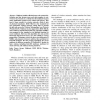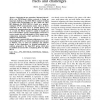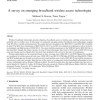113
click to vote
CORR
2010
Springer
14 years 11 months ago
2010
Springer
IEEE 802.16 standard supports two different topologies: point to multipoint (PMP) and Mesh. In this paper, a QoS mechanism for point to multipoint of IEEE 802.16 and BS scheduler ...
133
click to vote
GLOBECOM
2010
IEEE
15 years 4 days ago
2010
IEEE
The recently emerging WiMAX (IEEE 802.16) is a promising telecommunication technology to provide low-cost, high-speed and long-range wireless communications. To meet the growing de...
125
click to vote
NETWORK
2006
15 years 2 months ago
2006
During the last few years, users all over the world have become more and more accustomed to the availability of broadband access. This has boosted the use of a wide variety both o...
125
Voted
NETWORK
2008
15 years 2 months ago
2008
IEEE 802.16 mesh mode defines three types of resource scheduling: coordinated centralized, coordinated distributed, and uncoordinated distributed. While the standard defines the r...
141
click to vote
JCM
2006
15 years 2 months ago
2006
The IEEE 802.16 standard was designed for Wireless Metropolitan Area Network (WMAN). The coverage of this new technology is expanded up to 50 km. IEEE 802.16 also has inherent QoS ...
125
click to vote
JNW
2008
15 years 2 months ago
2008
Abstract-- Multicast enables efficient large-scale content distribution and has become more and more popular in network service. Security is a critical issue for multicast because ...
118
Voted
JCM
2008
15 years 2 months ago
2008
Deploying the new generation "Internet Protocol" (IPv6) over 802.16-based wireless networks is facing an important challenge as the IEEE 802.16 standard is failing to sup...
133
click to vote
COMCOM
2007
15 years 2 months ago
2007
IEEE 802.16 employs TDMA (Time Division Multiple Access) as the access method and the policy for selecting scheduled links in a given time slot will definitely impact the system ...
111
click to vote
CN
2007
15 years 2 months ago
2007
Wireless broadband technologies provide ubiquitous broadband access to wireless users, enabling services that were available only to wireline users. In this paper, we summarize em...
117
click to vote
CORR
2010
Springer
15 years 2 months ago
2010
Springer
This paper proposes a fair and efficient QoS scheduling scheme for IEEE 802.16 BWA systems that satisfies both throughput and delay guarantee to various real and non-real time app...



